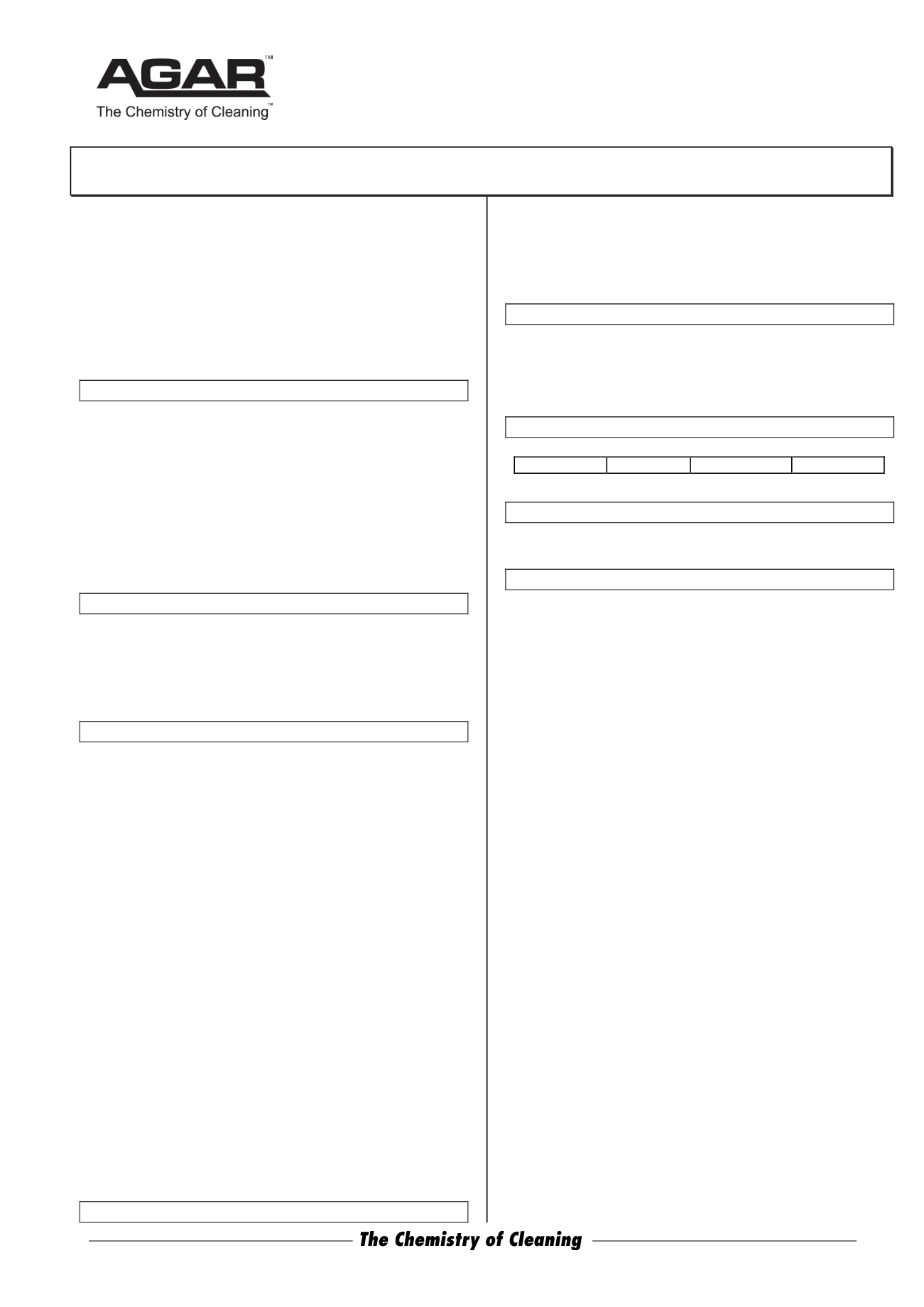

ABN 80 004 726 890 | MADE IN AUSTRALIA
Safety Data Sheet
Issued: March 8, 2016
Page 2 of 2
LCD-11 DETERGENT
Engineering Controls: Mechanical Ventilation: Not required.
Personal Protection:
Gloves – Impervious natural rubber, butyl rubber, nitrile or
PVC gloves should be worn.
Note: Resistance of glove materials can vary. Evaluate
resistance under conditions of use and maintain PPE
carefully.
Eye-protection – Splash-proof goggles should be worn.
Respiratory – Not normally needed.
9 PHYSICAL AND CHEMICAL PROPERTIES
Appearance: Transparent colourless liquid
Odour: None
pH = 13.2 – 13.7
Vapour Pressure: N/K
Vapour Density : N/K
Boiling Point : 115 - 125ºC
Freezing Point: < 0
°
C
Solubility in water: Infinitely miscible
Specific Gravity : 1.31
Evaporation rate : As water
% Volatile by vol: 0% VOC
10 STABILITY AND REACTIVITY
Stable.
Do not store in aluminium or galvanised containers. Store away
from acids. LCD-11 is a caustic product which attacks
soft metals.
Hazardous polymerization: None.
11 TOXICOLOGICAL INFORMATION
Health Effects:
Acute -
Swallowed
: Because of its high alkalinity in the undiluted
state, LCD-11 is corrosive to the gastro-intestinal tract if
swallowed. Considered to be toxic by all exposure routes.
Can kill if swallowed. Causes severe burns.
Skin:
Principal route of exposure is usually by skin contact.
Corrosive to the eyes and skin on contact. Skin contact may
cause swelling, redness, blistering, dermatitis or burns with
deep ulceration and gelatinous necrotic areas at the site of
contact. Skin contact may result in little pain, thus care
should be taken to avoid contamination of gloves and boots.
Eye:
Corrosive. Contamination of the eyes can result in
conjunctivitis and corneal burns and ulceration which can
result in permanent injury and possible loss of sight. Risk of
serious damage to eyes.
Inhaled:
Inhalation risk is low if product is used as directed,
but breathing of concentrated vapour should be avoided.
Health Effects -
Chronic:
None known.
Toxicity data: Not available for mixture.
For potassium hydroxide: Oral LD50 (rat) = 365 mg/kg
(potassium hydroxide solid). Potassium hydroxide has low
systemic toxicity.
(Note: this data is from published information. Agar Cleaning
Systems does not carry out animal tests).
12 ECOLOGICAL INFORMATION
Ecotoxicity: No data available.
Persistence and degradability: -
Mobility: -
Advice: Prevent contamination of waterways and drains.
13 DISPOSAL CONSIDERATIONS
For disposal, refer to State Land Waste Management authority.
Empty containers must be decontaminated. LCD-11 can
be greatly diluted or carefully neutralised with dilute acid and
flushed to drain with copious amounts of water.
14 TRANSPORT INFORMATION
UN No.: 1719
Class: 8
Packg.Group: II Hazchem: 2R
15 REGULATORY INFORMATION
Poisons Schedule Number: Schedule 6.
16 OTHER INFORMATION
AICS Listing:
All components of LCD-11 are listed on the
Australian Inventory of Chemical Substances (AICS).
Date: This SDS issued on March 8, 2016 shall remain valid for
5 years unless a new SDS is issued in the meantime. Please
contact Agar Cleaning Systems P/L to ensure you have the
latest version of this product’s SDS.
Abbreviations and Definitions of terms used:
<
less than
>
greater than
AICS
Australian Inventory of Chemical Substances
CAS
Chemical Abstracts Service (Registry Number)
COD
Chemical Oxygen Demand
deg C
Degrees Celsius
g
gram
g/L
grams per litre
HSIS
Hazardous Substance Information System
kg
kilogram
L
Litre
LC50
The concentration of a material (inhaled) that will be lethal to
50% of the test animals.
LD50
The dose (swallowed all at once) which is lethal to 50% of a
group of test animals.
m3
Cubic metre
mg
milligram
mg/m3
milligrams per cubic metre
miscible
A liquid that mixes homogeneously with another liquid
N/A
Not applicable
N/K
Not Known
NIOSH
National Institute for Occupational Safety and Health
non-haz
Non-hazardous
PEL
Permissible Exposure Limit
ppb
Parts per billion
ppm
Parts per million
STEL
Short term exposure limit
TLV
Threshold Limit Value
TWA
Time Weighted average
UN
United Nations (Number)
wt
weight
The information in this Data Sheet is based on our present knowledge. However, this
shall not constitute a guarantee for any specific product features and shall not establish a
legally valid contractual relationship. As far as lawfully possible, Agar Cleaning Systems
accepts no liability for any loss, injury or damage (including consequential loss) suffered
or incurred by any person as a consequence of reliance on the information and advice
contained herein.
End of SDS.


















